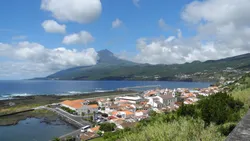

Lajes do Pico History and Features in Portugal
Discover the rich history and unique features of Lajes do Pico, Portugal. Explore its cultural heritage and stunning landscapes in the beautiful Azores.
Lajes do Pico, Azores
Mycarro AI
May 2, 2025
Introduction to Lajes do Pico
Lajes do Pico, a picturesque parish located on the southern coast of Pico Island in the Azores archipelago of Portugal, charms visitors with its breathtaking landscapes and rich cultural heritage. Known for its stunning views of the towering Pico Mountain, Lajes do Pico is a serene destination that offers a unique glimpse into the natural beauty and traditional lifestyle of the Azorean people. As the second-largest island in the Azores, Pico is famous for its volcanic landscapes, making Lajes do Pico not only a hub of natural wonders but also an essential part of the island's historical legacy.
Natural Wonders
One of the most striking features of Lajes do Pico is its dramatic coastline, where rugged cliffs meet the Atlantic Ocean. The parish boasts several breathtaking viewpoints, such as the Miradouro da Ponta do Escalvado, which offers panoramic views of the surrounding islands and the vast blue sea. Visitors can embark on hiking trails that range in difficulty, allowing both avid hikers and casual walkers to enjoy the region's lush vegetation and diverse wildlife. The area is often frequented by whale watchers who come to observe multiple species including fin whales and sperm whales.
Cultural Significance
Beyond its natural beauty, Lajes do Pico is also rich in cultural significance. The town's history is closely tied to whaling, a once-thriving industry that significantly contributed to the local economy. Although whaling is no longer practiced, the remnants of its history can be seen in the local architecture and maritime artifacts. The Whalers' Museum of Lajes do Pico serves as a poignant reminder of this history, offering insights into the traditional whaling practices of the Azores and showcasing the local heritage. It is a must-visit for anyone wanting to understand the historical significance of this coastal community.
Gastronomy
The culinary scene in Lajes do Pico proudly showcases the island's unique flavors and locally sourced ingredients. Sea-to-table dining is prevalent, with fresh fish and seafood taking center stage in many local dishes. The island is also known for its delicious cheeses and wines, making the gastronomy of Lajes do Pico an experience to savor. Dining at local restaurants not only provides the opportunity to taste traditional Azorean cuisine, but also to interact with locals who are eager to share their culinary secrets, history, and stories.
Festivals and Events
Lajes do Pico is home to various cultural festivals that celebrate its rich traditions and community spirit. One such event is the Festas de São João, held in June, where locals and visitors come together to partake in religious processions, vibrant parades, and traditional music. This festival highlights the close-knit community within Lajes do Pico and offers a chance for visitors to immerse themselves in the local culture. Another notable event is the New Year's celebration, where festivities showcase the island's natural beauty against a backdrop of fireworks illuminating the night sky over the Atlantic.
Activities and Adventures
For those seeking adventure, Lajes do Pico provides a plethora of outdoor activities. Kayaking, diving, and snorkeling are ideal ways to explore the surrounding marine life, while bike riding along the coastal paths offers a unique view of the landscape. Additionally, guided tours are available for those who wish to hike Pico Mountain, the highest peak in Portugal, offering unparalleled views from the summit. The rich biodiversity of the island, with its volcanic origins, provides endless opportunities for exploration and adventure.
Conclusion
Lajes do Pico, with its captivating landscapes and rich cultural heritage, is a hidden gem in the Azores that promises memorable experiences for every visitor. Whether exploring the rugged coastlines, indulging in local gastronomy, or partaking in vibrant cultural festivals, there is something for everyone in this charming parish. As more travelers discover the beauty and tranquility of Lajes do Pico, it is destined to become a treasured destination within the diverse tapestry of the Azorean archipelago.